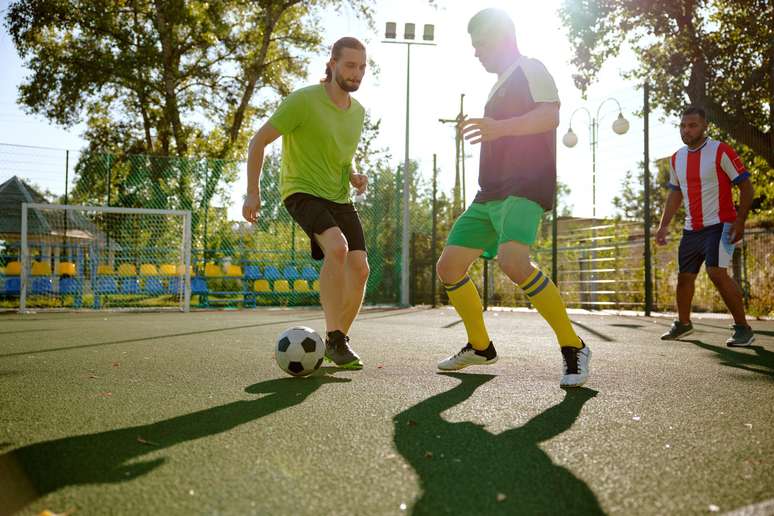Find out if it’s worth it and how to ensure your safety and efficiency It is common for many people to be inspired by high-performance athletes to also choose a sport to practice. But in the midst of a demanding routine, not everyone will have time to dedicate themselves 100%. Hence the “final athletes” […]
Find out if it’s worth it and how to ensure your safety and efficiency
It is common for many people to end up being inspired by high-performance athletes to choose a sport to play as well. But in the midst of a demanding routine, not everyone will have time to dedicate themselves 100%.
This is how “weekend athletes” are born, people who sometimes also participate in minor competitions and dedicate several hours of their free time to practicing sports, but do not aspire to be full-time athletes. Malu spoke with two experts to better understand the benefits and risks associated with being a weekend athlete and what you should do to become one safely.
There are those who turn up their noses at the weekend’s athletes…
Sport is life and brings a series of benefits, so much so that the recommendations of the World Health Organization (WHO) indicate that the ideal for everyone is to do around 150 minutes of moderate or intense physical activity per week. However, the most common thing would be to divide these minutes into a little physical activity each day. Therefore, many people (even professionals!) will disagree with the existence of these “weekend athletes”, pointing out the risk of heart damage and a higher incidence of injury.
In this regard, excellent news, since practicing physical activity will always be better than a sedentary lifestyle and will bring health benefits similar to those practiced every day, according to the conclusion of a British study published in 2023 in the journal Jama, which analyzed data from more than 90 thousand people over 6 years. The conclusions were that weekend athletes achieved similar benefits to people who always play sports, with a lower incidence of stroke and heart problems, compared to sedentary athletes.
“Physical activity is important for its countless benefits, including adjustment of body weight, increase in muscle mass, metabolic and cardiovascular improvement. It should be something routine, a ‘task’ for every day. However , if a person cannot do it every day or more frequently, it is better to do some activity than not do it at all”, comments Renan Bosio, orthopedic doctor and doctoral student in Sports Medicine.
As long as there is responsibility
The professional adds. “A weekend athlete can perform well, but before starting to train it is essential to consult a doctor and undergo routine tests to ensure cardiovascular health. And it makes no sense to limit yourself to exercising, but to continue with bad habits , such as alcohol consumption, cigarettes and an incorrect diet during the week, in fact, there is a greater risk of both heart attack and/or stroke and serious injuries, due to the intensity of the exercise. physical without prior medical evaluation”.
“One of the most common mistakes that weekend athletes make is doing heavy workouts without having the body prepared. Furthermore, there is the problem of lack of regularity. If you are a weekend athlete, you have to train, even if only during these two days. But if you can fit in another day of the week, the better. Furthermore, it is necessary to have multidisciplinary monitoring with specialists, to avoid stagnation”, adds Tobias Campbell, personal trainer specializing in EMS training.
There are so many weekend athletes!
“This label, weekend athletes, is often linked to people who simply don’t have time during the week to engage in exercise. Fortunately, more and more of them are coming to the office looking to prevent injuries and improve performance,” he points out Renan. Tobias states that almost half of
its students are “weekend athletes.” And they are found in the most diverse sports, but are most common in football, cycling and running.
“Often, the weekend is the jump-start that person needs and, over time, they will include more physical activity in their daily life. To start, I always recommend low-impact activities with low to moderate intensity and gradually increasing Warm-up Lifting is also essential, as it prepares the muscles for training, without warming up, the risk of injury increases significantly,” warns Tobias.
Looking for motivation to get started?
Tobias advises that the first step to getting started is, after an evaluation with a doctor, to choose an activity that gives you pleasure. “And pay attention to your body’s signals. Start without pressure to achieve great results and gradually increase the frequency and intensity. But knowing that yes, it is worth being an athlete, even on the weekend,” he says.
“The motivation beginners should look for is to aim for a longer, quality life, age well with loved ones and friends, watch their children and grandchildren grow, improve muscle and joint pain, lose weight, gain muscle mass, improve sleep, improve cardiopulmonary and sexual conditions, among other benefits. The ideal would be to practice it every day, but if this is not possible, remember that any movement, as long as it is done responsibly and carefully, will do you better. to your physical and mental health. sedentary lifestyle”, concludes Renan.
Source: Terra
Ben Stock is a lifestyle journalist and author at Gossipify. He writes about topics such as health, wellness, travel, food and home decor. He provides practical advice and inspiration to improve well-being, keeps readers up to date with latest lifestyle news and trends, known for his engaging writing style, in-depth analysis and unique perspectives.





![Tomorrow Belongs to Us: What’s in store for Friday 17 October 2025 Episode 2055 [SPOILERS] Tomorrow Belongs to Us: What’s in store for Friday 17 October 2025 Episode 2055 [SPOILERS]](https://fr.web.img5.acsta.net/img/96/95/96957c8eef9a3bd87daf877432629ae3.jpg)



